- Winter 2023
- Reflection on International Women’s Day 8 March 2023
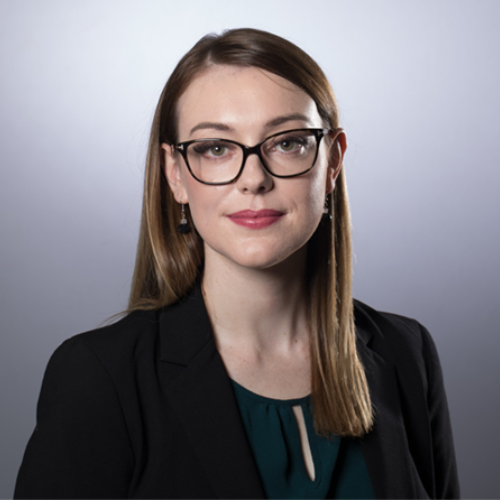
On 8 March 2023 the Women Lawyers Association of NSW, the Women Barristers Forum and the NSW Bar Association’s Diversity and Equity Committee came together to celebrate International Women’s Day.
On the day we were joined by our guest speaker, Wajiha Ahmed (Partner at Buttar, Caldwell & Co and former Commissioner of the NSW Community Relations Commission (now Multicultural NSW)) and Afghani Judge Farah Atahee (formerly a judge in Afghanistan and refugee).
We were also joined by members of the Women Barristers Forum, New South Wales Bar Association Diversity and Equity Committee, members and colleagues. Justine Anderson, President of the Women Lawyers Association of NSW outlined a brief background of International Women’s Day.
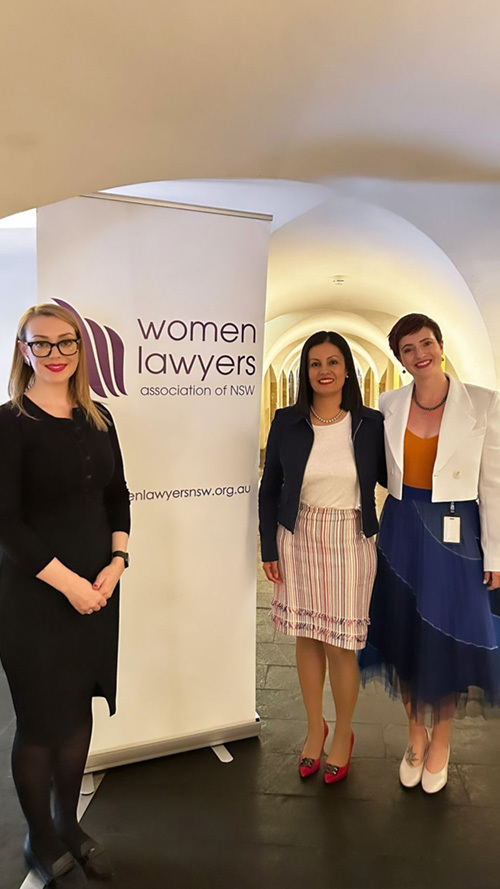
History of International Women’s Day
In 1910, Clara Zetkin, the leader of the Women’s Office for the Social Democratic Party in Germany tabled the idea of an International Women’s Day at the second International Conference of Working Women in Copenhagen. The proposal received unanimous support from over 100 women representing 17 countries.1 Zetkin argued that the day must be international because the sufferings of women are shared by all the oppressed, regardless of national borders. It is women’s day because, in Zetkin’s words, ‘the inhuman burden of global capitalism weighs with especial heaviness on women’.2
The very first International Women’s Day was held the following year on 19 March. Meetings and protests were held across Europe, with the largest street demonstration attracting 30,000 women. In 1913, International Women’s Day was moved to 8 March and has been held on this day ever since.3
Australia’s first International Women’s Day was held in 1928 in Sydney. Organised by the Militant Women’s Movement, women called for equal pay for equal work, an eight-hour working day for shop girls and paid leave. The next year, the event spread to Brisbane. In 1931, annual marches were launched in both Sydney and Melbourne and both marches continue to be held today.4
Since these early days, International Women’s Day has continued to grow. It is a day to celebrate women’s achievements and both highlight and work to address barriers that continue to perpetuate gender inequality.5 This may not thrill Clara Zetkin as she noted the day was not one of celebration but a day to remind ourselves – through taking to the streets and articulating an uncompromising will not to give up fighting – that the struggle for equality is not won until every woman can assume safety, health, and equal work opportunities (and thus be in a situation in which womanhood can be celebrated).6
The UN Women’s International Women’s Day theme for this year was Cracking the Code: Innovation for a Gender Equal Future. The UN advised:
To crack the code to gender equality, we need to leverage inclusive technologies, embrace disruptive innovation and ensure access to education – to combat generational and systemic gender-based discrimination, embedded in our cultural bias for generations.
We need to disrupt the current codes of behaviours, beliefs and systems that foster entrenched inequality through innovation, access, and education. We must crack our cultural, economic and social codes and behaviours that entrench inequality.7
The Women Lawyers Association of NSW in its history has lodged numerous submissions over the years calling for law reform relating to: discrimination, child care, equal pay, superannuation discrimination and trial procedures in rape cases (regarding prejudices associated with previous sexual history relating to the cross-examination of victims about their sexual history). Some of our most recent work can be seen in the Respect@Work report where we were quoted several times, and our suggested wording for legislative reform was accepted and enacted.
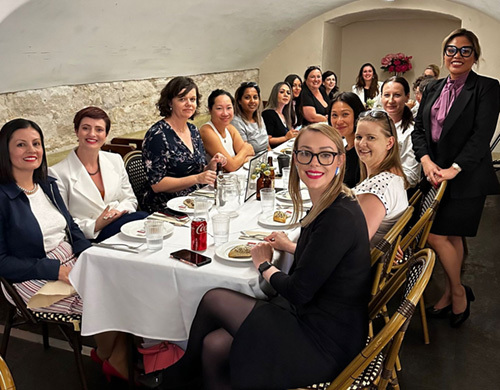

Some statistics on women in the legal profession:
Solicitors
The legal profession continues to comprise more female solicitors (53%) than male solicitors (47%). This is consistent across all states and territories. Since 2011, this represents a 67% increase in female solicitors while male solicitors increased by 26%. 48% of solicitors in private practice (56,180) are women – the largest sector.8
At the Bar
Of the 2422 practising barristers in NSW, 24.69% are women. Women barristers under 10 years of practice are in the overwhelming majority. Of the 397 senior counsel, 55 are women – representing 13.85%.9
This International Women’s Day, we heard from our guest speaker Wajiha Ahmed, who shared her experience as a woman and a woman of colour practising law in NSW for 21 years. She shared the successes, trials and tribulations of being a woman lawyer over the last two decades. She shared anecdotes of archaic tropes relating to her race, comments on her wardrobe choice, unwelcomed advances from male colleagues, and the difficulty of overcoming great personal challenges during busy periods of one’s legal career. It was a reminder of the unequal burden women carry if they dare to have children and continue to pursue a career. Wajiha’s open manner was both raw and refreshing, moving many in the room. Her speech demonstrated how far we have come and how much more there is to do in order to achieve equality in our profession, and to provide a safe space for women to discuss and connect over their experiences.
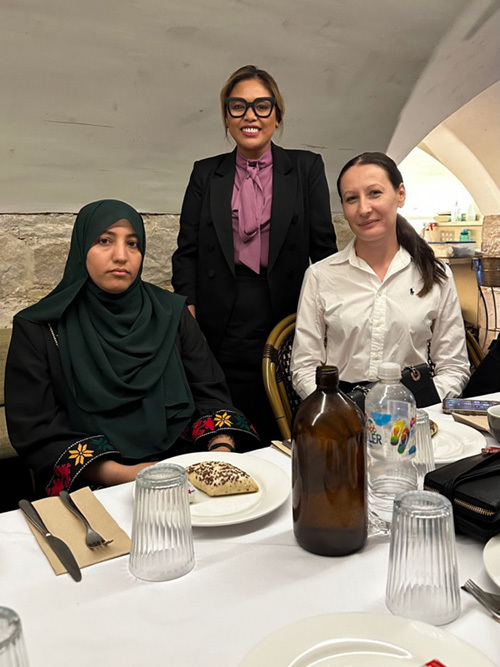
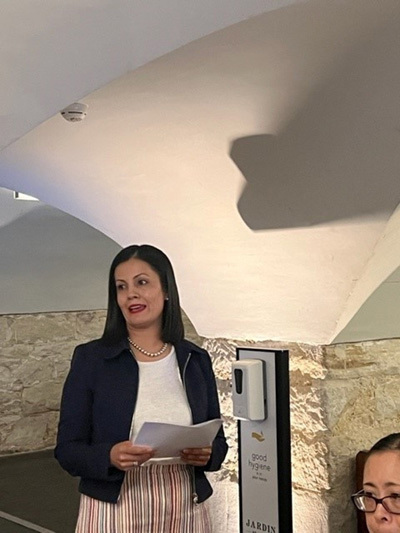
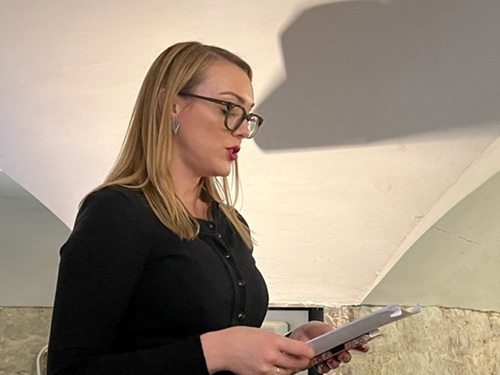
On 15 August 2021, the Taliban overthrew the government of Afghanistan sending the country into turmoil. Shortly after the overthrow, there were reports of women judges and lawyers receiving death threats from convicts freed by the Taliban, leading to many of these women fleeing their country as refugees.10 A number of women judges have been resettled in Australia as refugees. One of whom, Farah Atahee, was able to join us to celebrate International Women’s Day.
On International Women’s Day, women are not interested in being offered tokenistic cupcakes but in systemic change which leads to a more equal future. The gender pay gap still exists, over the past few years it has wriggled around and we are now seeing stagnation; it isn’t budging. A parody on the lyrics from Donald Yetter Gardner’s 1944 song, ‘All I want for Christmas is my two front teeth’; all women want for next International Women’s Day is equality – and maybe cupcakes. BN
ENDNOTES
1 UN Women Australia,< https://unwomen.org.au/get-involved/international-womens-day/about/ >
2 Oxford University Press, International Women’s Day: feminist philosophy with Clara Zetkin < https://blog.oup.com/2022/03/international-womens-day-feminist-philosophy-with-clara-zetkin/>
3 UN Women Australia,< https://unwomen.org.au/get-involved/international-womens-day/about/ >
4 UN Women Australia,< https://unwomen.org.au/get-involved/international-womens-day/about/ >.
5 UN Women Australia,< https://unwomen.org.au/get-involved/international-womens-day/about/ >.
6 Oxford University Press, International Women’s Day: feminist philosophy with Clara Zetkin < https://blog.oup.com/2022/03/international-womens-day-feminist-philosophy-with-clara-zetkin/>.
7 UN women https://unwomen.org.au/wp-content/uploads/2023/01/IWD-Key-Messages-2023-v2.pdf.
8 New South Wales Law Society, Gender Statistics, <https://www.lawsociety.com.au/advocacy-and-resources/advancement-of-women/gender-statistics>.
9 The New South Wales Bar Association, Statistics (accessed 8 February 2023) < https://nswbar.asn.au/the-bar-association/statistics> .
10 Australian Government, Department of Foreign Affairs and Trade: Thematic report on Political and Security Developments in Afghanistan, 14 January 2022, https://www.dfat.gov.au/sites/default/files/country-information-report-afghanistan.pdf.
